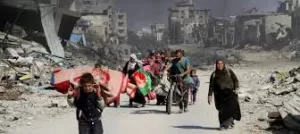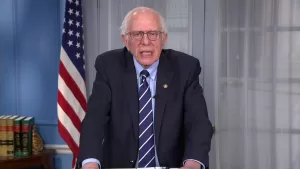This year marks the 20th anniversary of the 2003 U.S. invasion of Iraq. It also marks 20 years since the birth of the massive global antiwar movement that opposed the war.
One of the most compelling wings of that movement involved the hundreds of U.S. veterans who protested the war and occupation. In late 2004, I met Patrick Resta, an army medic who served in Iraq and came home to join the newly formed Iraq Veterans Against the War (IVAW). Resta became a leader within the group and spent nearly two years of his life organizing tirelessly against the war. I recently reconnected with Resta to revisit his and IVAW’s story for Truthout.
Today is Veterans Day, a holiday that can feed into unquestioning worship of militarism. Instead, on this Veterans Day, two decades after the invasion, with war drums growing louder across the world, we can choose to remember those who spoke out about the horrors and injustices of the war on Iraq and dedicated themselves to ending the occupation.
“I Believe This Is an Illegal Act”
Patrick Resta grew up in the suburbs of New York City. He enlisted in the military for the same reason many other soldiers did: to pay for college. He joined the Air Force in 1996, and then the Army National Guard in 1999. He was trained as a medic, and while he didn’t love the military, he enjoyed going through the Army medic school. He moved to South Carolina, where he got married.
On the morning of September 11, 2001, Resta was working on a civilian ambulance. He had just brought someone to the ER when he saw a group staring at the television in the break room. Resta immediately thought of his uncle and aunt who were stockbrokers at the World Trade Center. A plane had hit the range of floors where they worked. “That doesn’t look like something that people are going to survive,” thought Resta. Both his uncle and aunt perished that day.
Within weeks, Resta was placed on active duty. Within months, he started hearing more mention of “Iraq” and saw equipment being painted desert camouflage. Key figures in the Bush administration, we now know, were advocating for a war on Iraq almost immediately after the 9/11 attacks.
Into 2003, as the invasion became imminent, a huge antiwar movement emerged, with millions across the world taking to the streets. Resta, who “absolutely opposed” the invasion, was among their ranks, joining antiwar protests in Columbia, South Carolina.
Resta recalled his disgust when, out to dinner, he saw ROTC students order celebratory shots with the onset of the U.S. bombing campaign in Baghdad. “It was just revolting to me that people could behave that way,” he said.
Resta knew there was a “high probability” he’d be deployed to Iraq. In October 2003, he officially got the word. Before deploying, he read a widely circulated open letter to U.S. troops by antiwar veteran Stan Goff called “Hold on to your humanity.”
“I believe this is an illegal act,” Resta remembered thinking. He was worried about what he might witness in Iraq. “I did not want to take part in anything that I was going to have to carry with me for the rest of my life,” he said.
“Whose Fucking Side Are You On?”
Resta crossed over from Kuwait into Iraq in March 2004 with the 30th Brigade Combat Team under the command of the Army’s 1st Infantry Division. He served as a medic in a tank battalion and worked at its aid station. He joined patrols, did route clearance looking for improvised explosive devices (IEDs) and went on convoys to get supplies.
To his dismay, his unit’s armor was inadequate. His gas mask didn’t fit. He had taken out a loan to buy his own ballistic plates for his body armor because he was told he might not receive them. Soldiers nailed plywood to the side of Humvees, sprayed with high-gloss paint to make it appear like metal.
This was around the time that Defense Secretary Donald Rumsfeld faced criticism over poor equipment for U.S. troops sent to Iraq. “You go to war with the army you have, not the army you might want or wish to have at a later time,” Rumsfeld infamously said.
Resta still boils up today when discussing this, “just a complete disregard for people under your command,” he says.
Resta’s unit was stationed in Diyala Province, northeast of Baghdad. On March 13, 2004, they had their first soldier killed in action. It started to sink in, says Resta, “people are not going to come back from this thing.”
News of the violent abuses of Iraqi prisoners at Abu Ghraib prison broke shortly after Resta’s unit arrived in Iraq. On duty, he witnessed instances of racism and brutality toward Iraqis.
Near the start of his tour, Resta says a car of Iraqi civilians drove toward his base during an attack. Someone dragged the driver, who had been shot but was alive, to Resta and dropped him on the floor.
“I guess this haji piece of shit is yours now,” he told Resta.
Another time, a badly wounded Iraqi man approached Resta’s base in the middle of the night. Resta says he pleaded with the U.S. guards to let him help the man, or at least allow him to stay on the base, in safety, through the night.
“One of the soldiers at the gate swung his weapon around at me,” said Resta, “and said ‘Whose fucking side are you on?’”
Meanwhile, the army staged photo-ops distributing medicine in Iraqi villages. “We would hand out Tylenol to people that had kidney failure,” said Resta. During patrols, Resta saw troops throw rocks at Iraqi kids.
Numerous Iraq War veterans have testified about violence, dehumanization and cruelty toward Iraqis that they witnessed. According to the Costs of War Project at Brown University, more than 300,000 Iraqis were killed during the U.S. war and occupation of Iraq, and 3.5 million indirect deaths resulted from the wider U.S. “war on terror.”
“I’ve Got to Tell People How Messed Up This Is”
Resta returned to the U.S. in November 2004 and joined his then-wife in Philadelphia, where she had moved to attend school. He had trouble adjusting back to civilian life. He mostly couldn’t sleep, and when he could, he suffered nightmares. Concentration was difficult. He couldn’t handle crowds. He had to bring someone along just to go to a grocery store. Months later, he was diagnosed with post-traumatic stress disorder (PTSD).
Resta first heard about Iraq Veterans Against the War (IVAW) while he was still in Iraq. The group was formed by a handful of Iraq War veterans in July 2004 during a Veterans for Peace convention at Boston’s Faneuil Hall. “As comrades-against-arms, they would do whatever it took to bring an end to the ugly, misbegotten war they believed would change them and their country forever,” wrote journalist Nan Levinson in her book about the group. In the coming months, IVAW would expand, and in the coming years, new chapters would flourish.
IVAW was headquartered in Philadelphia. In late 2004, Resta attended a meeting with about a dozen veterans, and he soon joined the organization. Looking back, he says the decision was a no-brainer. “I knew, probably within my first two months that I was in Iraq, that if I survive this thing, I’ve got to tell people how messed up this is over here,” he said.
Resta threw himself into organizing with IVAW. Throughout 2005 and into 2006, he traveled almost every weekend, speaking at events, appearing on television and in documentaries, doing radio interviews, and attending protests and teach-ins. He joined bus tours across the country. He served as the group’s New England organizer and was elected as IVAW’s secretary.
Resta and other IVAW members joined Cindy Sheehan at Camp Casey in Crawford, Texas, the protest vigil she set up near George W. Bush’s ranch to honor her son who was killed in Iraq. Resta says the survivor’s guilt he felt around parents who lost children in the war was difficult. “I’m standing here saying none of what’s going on over there is worth it, and they’re here talking about their child that died over there,” he said.
The community he found within IVAW “quite literally saved my life,” says Resta. The support from older Vietnam veterans, some of whom had protested the Vietnam War and were active with Veterans for Peace, was extremely helpful, especially with addressing his PTSD.
“Hopefully It Gave Other People the Courage to Come Forward”
Resta left IVAW toward the end of 2006 to focus on his own recovery and to attend school. The organization was moving in new directions, and some of the founding leaders had left.
IVAW would continue to grow and organize in the years after Resta left, expanding to dozens of chapters, carrying out an array of protest actions, organizing hearings into war crimes, and supporting soldiers who refused orders to deploy. The group later changed its name to About Face: Veterans Against the War. About Face recently came out in support of a ceasefire in Gaza. “Israeli government officials are openly declaring their intent to wreak devastation on Palestinians in Gaza,” the group said in a post on X (formerly Twitter). “Biden can and must demand a ceasefire to prevent further loss of life.”
Looking back, Resta feels proud that he spoke out. “It was important for me because of what I witnessed,” he said. “Very shortly into my time there, it was clear to me that nothing happening there was worth anyone dying over, Americans or Iraqis, and that the Iraqi people certainly didn’t want us there.”
As for the impact of the antiwar movement, he’s still not sure. “I had this naive idea that the American public just wasn’t aware, and if they were, they’d be outraged, and the war would stop quickly if this stuff was brought to light,” he said.
Resta still holds anger toward the generals and admirals who oversaw the war. Unlike rank-and-file soldiers who risked imprisonment by speaking up, top military brass had more freedom to criticize administration policies and the war’s conduct. Few did.
“A lot of them are working for defense contractors now,” said Resta, “making hundreds of thousands of dollars.”
Twenty years after the invasion of Iraq, Resta works as a registered nurse, continuing his calling for care. He says the “only positive thing” he’s taken away from his service is that “taking care of wounded people over there made me better at my job now.”
As an army medic, Resta said his job was to look out for soldiers’ welfare and safety. In joining IVAW, he said in 2005, “I’m doing more towards that end now than I ever did in the military.”
As mainstream celebrations of Veterans Day blur into endorsements of militarism and U.S. foreign policy, it’s worth remembering the example of groups like IVAW, made up of many hundreds of veterans, who summoned the courage to speak out against the Iraq War and to take the antiwar movement into the military itself.
As an early IVAW organizer, Resta hopes his example brought others into the movement. “Hopefully it gave other people the courage to come forward and talk about what they did and what they saw, and help them get on the path to healing,” he said.
(Derek Seidman is a writer, researcher and historian living in Buffalo, New York. Courtesy: Truthout, a US nonprofit news organization dedicated to providing independent reporting and commentary on a diverse range of social justice issues.)




